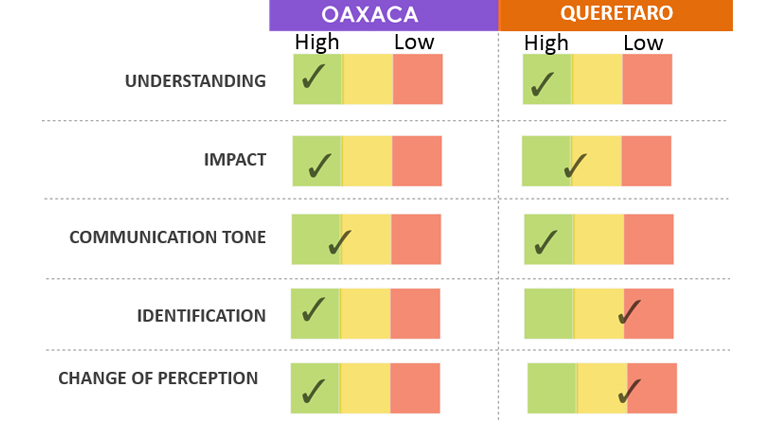Challenge
As financial inclusion spreads worldwide, the issue of how to provide effective financial capability training is a growing concern for policymakers. Data on the use of financial services in Mexico indicate that many people could benefit from simple advice. The 2012 Mexican Financial Capability Survey found that significant majorities agree with statements that show a short-term mentality such as “The future will take care of itself.” No surprise, then, that only 7 percent of Mexicans save in a formal account, compared to a regional average of 10 percent. Moreover, only 12 percent of Mexicans in the bottom 40 percent by income distribution have a formal transaction account, compared to 41 percent in Brazil.
Solution
One area where Mexico does not lag is access to television—approximately 95 percent of households own at least one set. To integrate financial education with televised entertainment, the World Bank worked with the producers of the Mexican telenovela Mucho Corazón to include financial messages in several story lines across 7 of 35 episodes. World Bank staff advised the show’s producers on the selection of financial topics and reviewed some scripts.
Mucho Corazón is a typical telenovela—but with a financial twist—intended to educate as well as to entertain. It tells the story of Maruch, a young indigenous woman from a rural community in Chiapas. Creating a budget, saving, investing, and avoiding financial abuse are all themes in Mucho Corazón.
Mucho Corazón was broadcast in 2012 in Chiapas and subsequently in approximately 20 other Mexican states through state-owned TV channels and in six other countries, mostly in Central America.
Results
Lessons were drawn from a qualitative evaluation of the financial messages in Mucho Corazón in two Mexican states, Queretaro and Oaxaca. The research included twelve diverse focus groups and 32 individual interviews, in both of which participants saw the same short scenes from the telenovela where financial issues were being addressed. The two most important results that emerged were:
1. People liked learning through entertainment media. Viewers enjoyed learning about financial topics through Mucho Corazón and saw financial topics as an advantage for the soap—something useful and new in entertainment programming. In particular, viewers saw the discussion on savings positively.
2. The effects of the intervention were context specific. To analyze and compare viewers’ reactions to Mucho Corazón, the interviews asked respondents to evaluate the clips on five dimensions. Figure 1 shows the results regarding the savings theme for both Oaxaca and Queretaro. Both groups understood the educational message about savings and said it was conveyed clearly. In Oaxaca, viewers also indicated a high level of identification with the topics and said they experienced a “change of perception” that could lead to behavior change. Oaxaca is one of Mexico’s southernmost states, borders Chiapas (where Mucho Corazón was produced and filmed), has a large indigenous population, and incomes are below the national average. Residents of Queretaro, by comparison, were less likely to identify with the clips, and few indicated that their attitudes were affected by a “change of perception” that could lead to behavior change because of the show. Queretaro is north of Mexico City, is more urban and has a higher-income population. In other words, Mucho Corazón was more effective where people more closely identified with the characters and setting.
